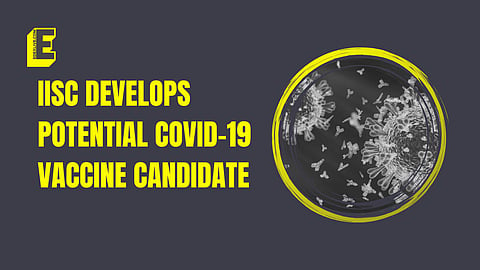

A professor at the Indian Institute of Science (IISc) in Bengaluru and collaborators created a synthetic antigen that may be generated as a potential COVID-19 vaccine candidate.
Raghavan Varadarajan, Professor at the Molecular Biophysics Unit (MBU), IISc, and collaborators have been working on producing a heat-tolerant vaccine that can offer protection against diverse strains of SARS-CoV-2 – both present and future versions – since the commencement of the COVID-19 pandemic, reports PTI.
According to a press statement issued by the institute in Bengaluru on Wednesday, the scientists revealed in a paper published in Nature Journal’s 'npj Vaccines' that their vaccine candidate is effective against all existing strains of SARS-CoV-2 and can be readily altered for future versions as well.
What about current vaccines?
While current vaccinations are effective against the majority of SARS-CoV-2 strains, their efficacy has deteriorated due to the virus's fast evolution, according to the study.
After studying numerous proteins identified in the virus, the researchers decided to construct their vaccine candidate using two sections of SARS-CoV-2's spike protein, the S2 subunit and the Receptor Binding Domain (RBD).
The S2 subunit is highly conserved and mutates far less frequently than the S1 subunit, which is the target of the majority of existing vaccines.
RBD can potentially elicit a robust immunological response in the host, according to scientists.
As a result of integrating these two components, the researchers developed RS2, a hybrid protein. The researchers investigated the expression of the hybrid protein using mammalian cell lines.
"The protein showed very high levels of expression, and I [initially] thought that the experiment was not working properly," said Nidhi Mittal, PhD student at MBU and first author of the study.
This means that it can potentially be produced in large quantities, she added.
The protein's effects were then tested on mice and hamster models. They discovered that the hybrid protein elicited a significant immune response and gave superior protection than vaccinations containing the entire spike protein.
The RS2 antigen can also be held at room temperature for a month without the need for cold storage, unlike many vaccines on the market, it said, adding that this would make the distribution and storage of these vaccine candidates more cost-effective.
When the quest began
Varadarajan noted that his team began developing the vaccine before the pandemic's impacts became prevalent in India. "At that time, the Bill and Melinda Gates Foundation provided us with funding and support," he added.
Varadarajan's team has been developing viral vaccines, notably ones against AIDS and influenza, since 2000.
They used this knowledge to develop their current RS2-based COVID-19 vaccine candidate in partnership with the start-up Mynvax, which was previously incubated at IISc, according to the release.
The vaccine candidate, according to the team, may be customised to include the RBD region of any new variation of SARS-CoV-2 that may appear.
Its high levels of expression and room temperature stability can significantly lower production and distribution costs, making it ideally suited for combatting COVID-19.
